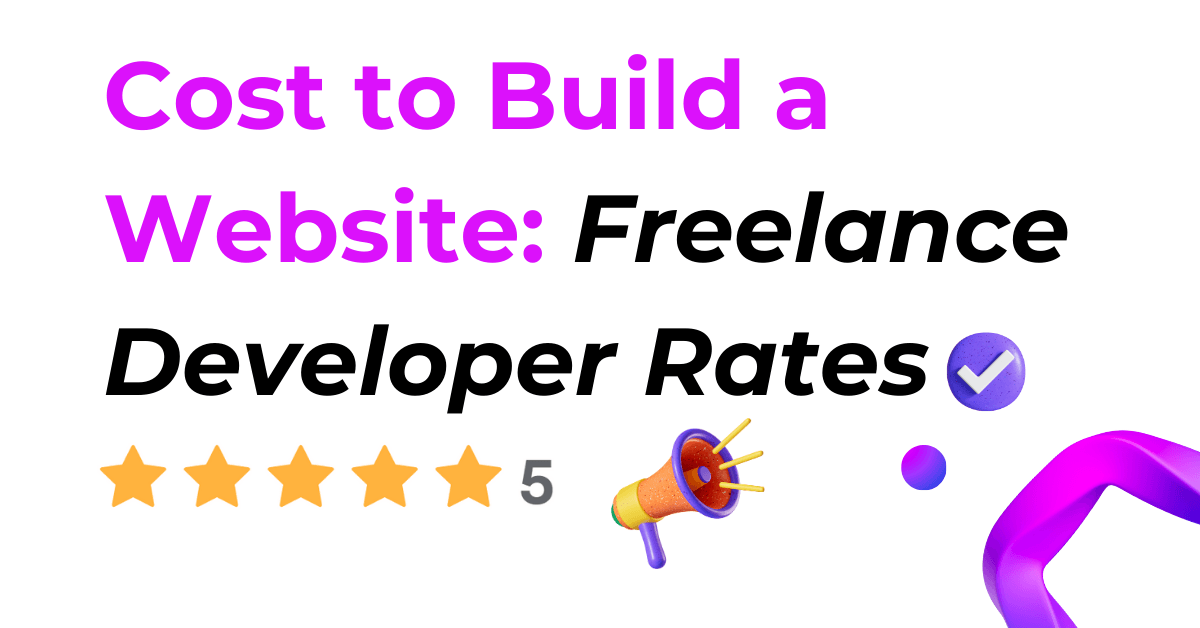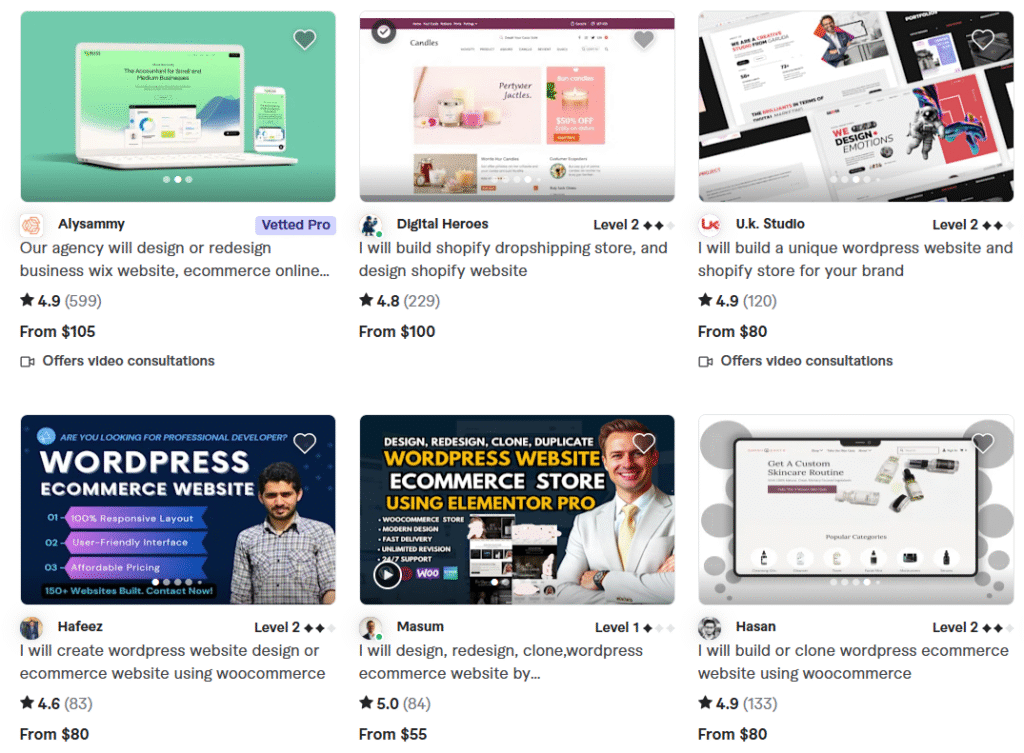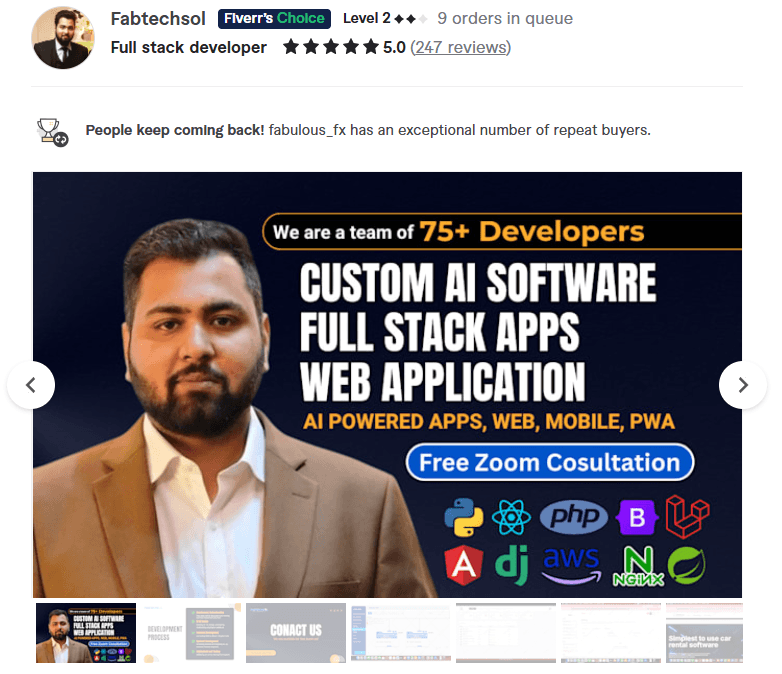Discover the true cost of building a website with expert freelance developers. Explore average rates, factors, and tips to hire the right talent for your project.
In today’s digital-first world, having a professional website is no longer optional—it’s essential. Whether you’re launching a personal blog, showcasing a portfolio, or building an online store, your website is often the first impression your audience gets. But one of the most common questions people ask before getting started is: “How much does it cost to build a website?”
The answer isn’t one-size-fits-all. Website costs can vary dramatically depending on your goals, features, and—most importantly—the person or team you hire to build it. Freelance web developers, in particular, offer a wide range of pricing structures based on experience, region, and project scope.
In this article, we’ll break down the key factors that influence website development costs, reveal average freelance developer rates in 2024–2025, and guide you on how to hire the right professional without overspending. Whether you’re working with a tight budget or planning a high-end build, understanding these costs upfront can help you make informed decisions.
Table of Contents
1. What Determines the Cost of Building a Website?

The cost of building a website can vary widely depending on several critical factors. Understanding these variables will help you estimate a realistic budget and avoid unexpected expenses down the line. Here’s a breakdown of what typically influences the total cost:
a. Type and Purpose of the Website
The kind of website you want to build plays a major role in determining its cost. A personal blog or portfolio site is far less complex (and cheaper) than a feature-rich eCommerce platform or a custom web application. For instance:
- A simple one-page site may cost as little as $300.
- An e-commerce site with product pages, cart systems, and payment gateways could start at $2,000+.
b. Design Complexity
Custom-designed websites usually cost more than websites using pre-made themes or templates. If you need:
- Custom UI/UX design
- Interactive features
- Advanced animations or branding elements
…expect to pay a premium for design hours and creativity.
c. Number of Pages & Features
The more pages and functionalities your website has, the higher the cost. Common features that can impact pricing include:
- Contact forms
- Booking systems
- Blog integration
- Search functionality
- Membership portals
Each feature adds more time and skill requirements, which increases the development cost.
d. Content Management System (CMS) vs. Custom Code
Websites built on CMS platforms like WordPress, Shopify, or Wix are typically faster and cheaper to develop. On the other hand, custom-coded websites using HTML, CSS, JavaScript, and frameworks like React or Laravel offer more flexibility, but at a higher cost.
e. Hosting and Domain Name
While not part of development costs directly, hosting and domain registration are recurring expenses. Expect to spend:
- $10–$20/year for a domain name
- $5–$30/month for shared or managed hosting
Premium hosting (like VPS or dedicated servers) can go up to $100+/month.
f. Responsive & Mobile-Friendly Design
Most developers include responsive design by default, but making a site work flawlessly across all devices can still add to the time and budget, especially if you’re going for pixel-perfect mobile optimization.
g. SEO Optimization and Site Speed
If you want your website to rank on Google and load fast, freelance developers may charge extra for SEO setup, caching plugins, performance testing, and other optimizations.
2. Freelance Developer Rates Overview (2024–2025)
When it comes to hiring a freelance web developer, one of the most critical questions is: “How much will it cost me?” The answer varies significantly based on several factors, including the developer’s skill level, location, and the type of work involved.
Average Hourly Rates by Experience Level
| Experience Level | Hourly Rate (USD) |
|---|---|
| Beginner (0–1 year) | $15 – $30/hr |
| Intermediate (2–4 years) | $30 – $60/hr |
| Experienced (5+ years) | $60 – $100/hr+ |
| Specialized Experts (e.g., eCommerce, Web Apps) | $100 – $150+/hr |
Note: Rates are typically higher for developers in North America, Western Europe, and Australia, while freelancers in countries like India, Pakistan, and Eastern Europe may offer competitive rates for similar skill sets.
Freelance Developer Rates by Region
| Region | Typical Hourly Rate (USD) |
|---|---|
| United States | $50 – $150/hr |
| United Kingdom | $40 – $120/hr |
| Western Europe | $40 – $100/hr |
| Eastern Europe | $25 – $60/hr |
| India & Pakistan | $15 – $40/hr |
| Southeast Asia | $15 – $35/hr |
| Latin America | $20 – $50/hr |
Hourly vs. Fixed-Price Contracts
- Hourly Contracts are best for projects with an evolving scope or when working on a retainer basis. You’re billed based on time spent.
- Fixed-Price Projects are common when the project scope is clearly defined. This model can range from $300 for a simple website to $10,000+ for a complex custom build.
What Influences the Rate?
- Technical Stack: Developers working with newer technologies (React.js, Node.js, Next.js, etc.) tend to charge more.
- Portfolio Quality: A strong portfolio justifies premium pricing.
- Niche Expertise: Developers who specialize in eCommerce (Shopify, WooCommerce), SaaS, or performance optimization typically command higher rates.
3. Freelance Web Development Pricing by Website Type
The cost to build a website can vary significantly depending on the type of website you need. Freelance web developers often tailor their pricing based on complexity, functionality, and the estimated time required. Below is a breakdown of common website types and what you can expect to pay when hiring a freelancer:
Personal Blog or Portfolio Website
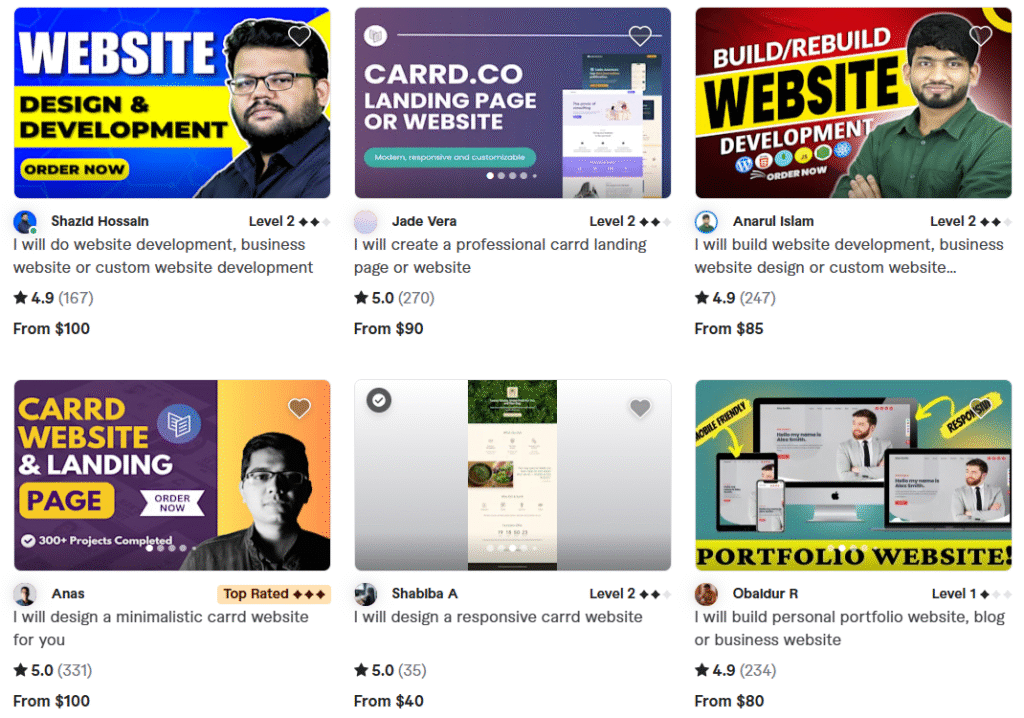
Estimated Cost: $100 – $1,000
These are simple, content-driven sites typically built with platforms like WordPress or Wix. Freelancers charge lower fees for these projects since they involve minimal features and often use pre-made themes.
Includes:
- 3–5 pages (Home, About, Blog, Contact)
- Responsive design
- Basic SEO setup
Small Business Website
Estimated Cost: $300 – $3,000
Designed to establish an online presence for local or small businesses, these sites usually have more branding and content requirements than personal blogs.
Includes:
- 5–10 pages (Home, Services, Testimonials, Blog, Contact)
- Mobile-friendly layout
- Basic contact forms or integrations (e.g., Mailchimp, Calendly)
- Light customization
Check The Lists: 5 Best Website Developers for Small Business Hire on Fiverr
eCommerce Website
Estimated Cost: $299 – $5,000+
Selling online adds complexity. Freelancers must integrate payment systems, product management tools, and potentially custom checkout flows.
Includes:
- Product pages and cart/checkout
- Payment gateway integration (e.g., PayPal, Stripe)
- Inventory management
- User account functionality
- Custom plugins or Shopify/WooCommerce setup
Custom Web Applications or SaaS Platforms
Estimated Cost: $1,000 – $10,000+
Highly tailored platforms like online booking systems, job boards, or software dashboards require backend logic, databases, and custom features.
Includes:
- User authentication
- Admin panel
- APIs & integrations
- Scalable architecture
- Ongoing maintenance and support
Freelancers may also offer add-ons such as:
- Copywriting: +$100–$500
- SEO optimization: +$200–$1,000
- Monthly maintenance: $50–$300/month
📌 Pro Tip: Always ask for a detailed quote and project scope before starting to avoid hidden costs.
4. Freelance Web Developer Pricing Models
![How Much Does It Cost To Build A Website? [Freelance Developer Rates]](https://hirebestfreelance.com/wp-content/uploads/2025/05/Screenshot-2025-05-25T062046.681-1024x754.png)
When hiring a freelance web developer, it’s important to understand the different pricing models they may use. This knowledge helps you plan your budget more accurately and avoid unexpected costs. Below are the most common freelance pricing structures:
a) Hourly Rate Pricing
Many freelance developers charge by the hour, especially for short-term or ongoing projects. Hourly rates vary widely based on experience, location, and complexity of work. Here’s a general breakdown:
- Beginner Freelancers: $15–$40/hour
- Mid-Level Developers: $40–$80/hour
- Senior or Specialized Experts: $80–$150+/hour
This model is ideal if your project scope is flexible or if you need continuous support and updates.
Pros:
- Pay only for hours worked
- Flexible for ongoing or evolving projects
Cons:
- Costs can increase unexpectedly if the project drags on
- Requires close tracking and time management
b) Project-Based Pricing
With project-based pricing, the freelancer charges a fixed amount for the entire project based on your requirements. This model is commonly used for one-off website builds like landing pages, business websites, or small eCommerce stores.
Typical price ranges:
- Basic website: $500–$1,000
- Business website: $1,000–$3,000
- Complex/custom website: $3,000+
Pros:
- Clear, upfront pricing
- Easier budgeting for clients
Cons:
- Changes in scope may lead to extra charges
- Less flexible for ongoing development
c) Retainer or Monthly Maintenance Packages
Some developers offer ongoing monthly packages for website maintenance, updates, or minor development tasks. These retainers can range from $100 to $1,000+ per month, depending on the level of support.
Typical inclusions:
- Regular backups and updates
- Security monitoring
- Speed optimization
- Small edits or tweaks
Pros:
- Continuous support
- Peace of mind for non-technical clients
Cons:
- It may not be necessary for static or rarely updated sites
- Long-term commitment
d) Add-Ons and Optional Services
Freelancers may also offer extra services at additional cost. These might include:
- SEO Optimization: $200–$1,000
- Content Writing: $50–$500 per page
- Custom Animations: $200–$1,500
- Performance Optimization: $100–$500
Always ask for a breakdown of what’s included in the base rate and what will cost extra.
Final Tip:
Before agreeing to any pricing model, ensure the developer provides a clear contract or proposal detailing timelines, deliverables, and payment milestones. This helps set expectations and prevents disputes.
5. Platforms to Hire Freelance Web Developers
Finding the right freelance web developer starts with choosing the right platform. Each marketplace offers different pricing structures, skill levels, and hiring processes. Here are the top platforms to consider:
1. Fiverr
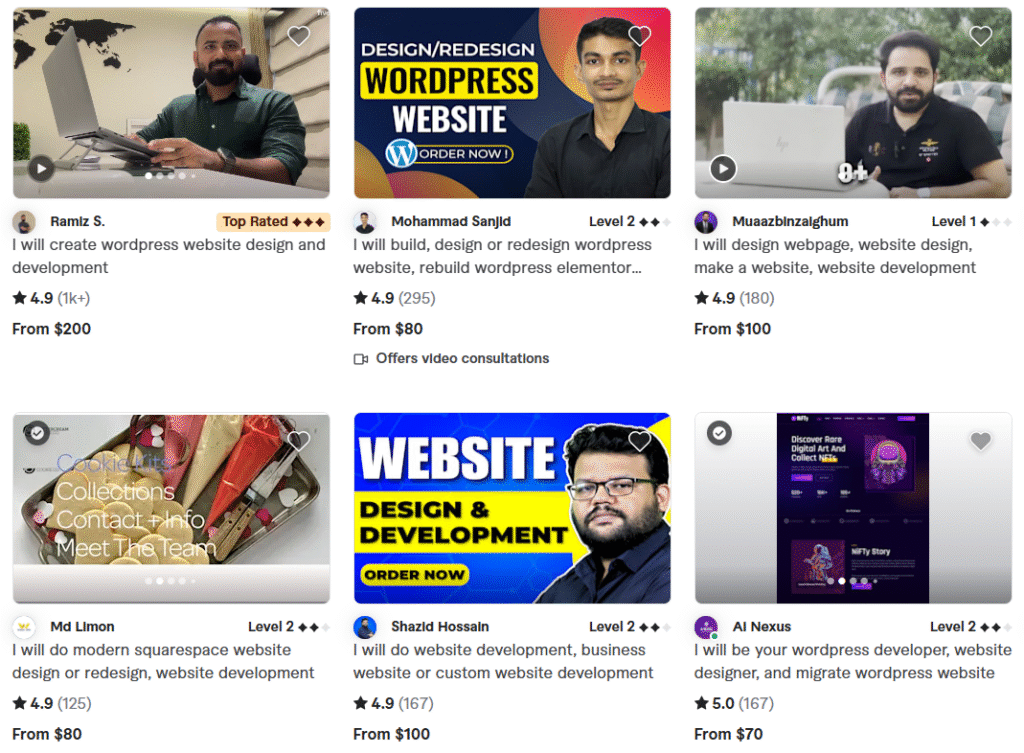
Fiverr is an excellent option for hiring freelance web developers, especially if you’re looking for affordable and transparent pricing. Developers on Fiverr offer services in “gig” formats, with clear deliverables and tiered packages (Basic, Standard, Premium).
Pros:
- Cost-effective options for all budgets
- Easy-to-navigate interface with service categories
- Reviews, portfolios, and delivery timeframes provided up front
Best For: Quick projects, one-off website builds, or startups on a budget
🔗 Tip: Look for “Fiverr Pro” freelancers for vetted professionals with higher-end services.
2. Upwork
Upwork is one of the most popular freelancing platforms for hiring skilled web developers. You can post a job, get proposals, or search and invite specific freelancers.
Pros:
- Access to freelancers worldwide
- Hourly or fixed-price contracts
- Built-in collaboration tools and time tracking
Best For: Medium to complex projects, ongoing development needs
3. Toptal
Toptal claims to provide the “top 3% of freelance talent.” It has a rigorous screening process to ensure you get experienced professionals. While the rates are higher, the quality and reliability often justify the investment.
Pros:
- Vetted elite developers
- Strong focus on quality and communication
- Ideal for long-term or high-stakes projects
Best For: Corporate websites, custom applications, enterprise clients
4. Freelancer
Freelancer.com operates on a bidding system. You post a job, and freelancers submit proposals with pricing and timelines.
Pros:
- Competitive pricing due to a bid-based model
- Useful milestone payment system
- Large talent pool
Best For: Small businesses or individuals who want to compare multiple quotes
5. PeoplePerHour
This UK-based freelance marketplace lets you hire by the hour or for fixed-price projects. It also offers pre-set service packages similar to Fiverr.
Pros:
- Quick turnaround for small tasks
- Easy project management dashboard
- Local hiring options are available
Best For: Short-term or one-time jobs with a quick deadline
Final Tip:
Before hiring on any platform, always check portfolios, read client reviews, and clarify the scope of work to ensure a successful collaboration.
6. Tips for Saving Money Without Compromising Quality
Hiring a freelance web developer doesn’t have to break the bank. With the right strategy, you can cut unnecessary expenses while still getting a high-quality website that serves your needs. Here are some practical tips to help you save money without compromising on quality:
1. Define Your Website Requirements Clearly
Before you reach out to any freelancer, have a detailed outline of what you need. Include must-have features, design inspiration, number of pages, and any functionality like contact forms or booking systems. A clear scope prevents unnecessary revisions and avoids paying for extras you don’t need.
2. Start with a Template or Theme
Custom designs cost more time and money. Many freelancers can customize premium WordPress or Shopify themes to suit your brand for a fraction of the cost of building from scratch. This approach is perfect for small business websites, blogs, or portfolios.
3. Use Freelance Platforms Like Fiverr
Platforms like Fiverr offer a wide range of affordable packages from vetted web developers. You can find budget-friendly options starting as low as $100, especially for simple websites. Use filters to compare ratings, delivery time, and past work.
4. Outsource in Stages
If your budget is tight, consider building your site in phases. Start with a basic MVP (Minimum Viable Product) and add more features or pages later. This staggered approach helps spread out the cost without compromising quality.
5. Provide Your Own Content and Assets
Web developers often charge extra for writing copy, finding images, or designing logos. You can reduce costs by preparing your own text content, providing logos, and sourcing royalty-free images ahead of time.
6. Hire Based on Value, Not Just Price
Don’t always go for the lowest bid. Instead, focus on freelancers who offer the best value—good communication, a strong portfolio, and positive reviews. A higher upfront cost often saves you money in the long run by avoiding costly revisions or poor-quality work.
7. Communicate Effectively
Frequent miscommunication leads to delays and extra charges. Be specific in your instructions and use tools like Trello, Loom, or Google Docs to streamline collaboration. Clear and timely feedback helps the freelancer deliver exactly what you want, on time and on budget.
7. Red Flags to Avoid When Hiring a Freelancer
Hiring a freelance web developer can be a fantastic way to get a quality website without breaking the bank. However, not every freelancer is the right fit, and some warning signs should prompt caution before you commit. Here are some key red flags to watch out for when hiring a freelancer:
1. Unclear or Vague Pricing Structure
If a freelancer cannot provide a clear breakdown of costs or gives you an estimate that’s too good to be true without details, it’s a warning sign. Hidden fees or surprise charges can quickly inflate your project budget.
2. Lack of Portfolio or Verified Reviews
A reputable freelancer will have a portfolio showcasing past projects and client testimonials or reviews. If they can’t share examples of their work or references, it’s hard to judge their skills or reliability.
3. Poor Communication
Effective communication is critical for project success. If your freelancer is slow to respond, vague in answers, or avoids discussing important details, it can lead to misunderstandings, delays, and a final product that doesn’t meet your expectations.
4. No Formal Contract or Scope Agreement
Never start work without a clear contract or scope of work document. This should outline deliverables, deadlines, payment terms, and responsibilities. Freelancers unwilling to formalize these terms may leave you vulnerable to project delays or disputes.
5. Overpromising Without Realistic Timelines
Be cautious if a freelancer promises an unrealistically fast turnaround or guarantees results that seem exaggerated. Quality work takes time, and rushing can compromise the final outcome.
6. No Post-Launch Support or Maintenance Plan
Websites often need updates, bug fixes, or minor tweaks after launch. If your freelancer does not offer any ongoing support or maintenance options, you might find yourself stuck without help when issues arise.
7. Requests for Full Payment Upfront
While some deposits are standard, beware of freelancers demanding full payment before starting any work. It’s safer to negotiate a payment plan tied to project milestones.
By keeping these red flags in mind, you can protect yourself from common pitfalls and ensure your freelance web developer delivers a website that fits your needs and budget.
Check Related Post: 5 Best Freelance Web Designers for Hire on Fiverr
Final Thoughts: How to Choose the Right Freelance Developer for Your Budget
Choosing the right freelance developer is crucial to ensure your website is built efficiently, effectively, and within your budget. While it’s tempting to go for the lowest price, quality and reliability should never be compromised. Here are some key points to help you make the best decision:
Balance Cost and Skill: Look beyond just the hourly rate or project fee. Experienced developers may charge more upfront, but their expertise can save you time and costly mistakes in the long run. Evaluate their portfolio and previous work to see if their style and quality match your expectations.
Clear Communication is Key: A freelancer who communicates well can understand your vision better and keep you updated throughout the project. This reduces misunderstandings and helps ensure the project stays on schedule and budget. Don’t hesitate to ask questions and clarify details before hiring.
Consider Long-Term Support and Scalability: Building a website isn’t a one-time task. Your developer should offer maintenance, updates, and support after launch. Also, consider if they can scale your site in the future as your business grows or your needs change.
Define Your Budget and Expectations Early: Be upfront about your budget and what you expect from the project. A transparent discussion helps the freelancer tailor their services accordingly and avoid surprises later.
By carefully weighing these factors, you can find a freelance developer who offers the best value for your money, delivering a professional website that supports your goals without breaking the bank.
Frequently Asked Questions (FAQ)
How long does it take a freelancer to build a website?
The timeline varies based on the website’s complexity. A simple personal or portfolio site may take 1–2 weeks, while an e-commerce or custom web app can take several weeks to a few months. Clear communication and well-defined requirements speed up the process.
Can I build a website for under $500?
Yes, it’s possible to build a basic website under $500, especially using templates or pre-built themes with minimal customization. However, complex features, custom designs, and eCommerce functionality usually require a higher budget.
What is the difference between hiring a freelancer and an agency?
Freelancers typically offer more affordable rates and direct communication, but might have limited resources. Agencies provide a full range of services (design, development, marketing) with a team, but their costs are usually higher. Your choice depends on your budget and project scope.
Do freelance developers offer support after delivery?
Many freelance developers offer post-launch support or maintenance packages, but it’s important to clarify this before hiring. Some include a warranty period for bug fixes, while ongoing support is often a separate contract.
How do I protect myself when working with a freelancer?
Protect yourself by having a clear contract outlining the scope, deadlines, payment terms, and deliverables. Use trusted platforms that offer payment protection and dispute resolution. Always review the freelancer’s portfolio and client feedback before hiring.
